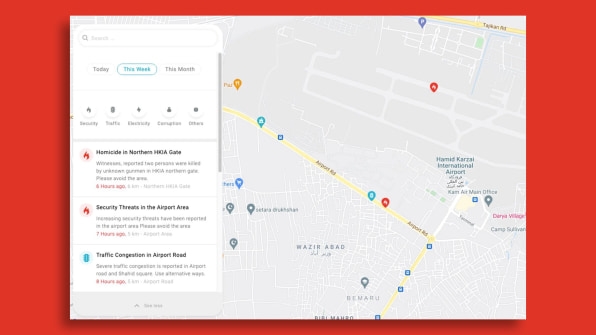Three and a half years ago, on a walk home from work in Kabul, Afghanistan, Sara Wahedi narrowly missed being struck by a suicide bombing, part of an attack that ended up lasting hours. In the aftermath, with the streets blocked and broken glass everywhere, Wahedi was struck by the fact that she couldn’t find information about what had happened—or when roads would open or the power would come back or whether it was safe to go outside.
“It led me to wonder why an alert system didn’t exist in a country like Afghanistan, which has been crippled by instability over the last two decades, and with so much money going into social development and community development, how there wasn’t something that people could turn to to find verified, real-time information about security and city services,” she says.

[Photo: Ehtesab]
Wahedi, now 26 years old, decided to create a solution herself, working with a team to build Ehtesab, an app that crowdsources information from citizens during a crisis, verifies it, and then sends real-time alerts. (The name is an amalgamation of different local languages and suggests the idea of transparency and accountability.)
“We designed it to be as simple to use as possible because it’s a crisis app,” she says. When the app opens, there’s a button to send a report if someone is witnessing a problem, ranging from at attack, to a street blocked by garbage, to a power outage. There’s also a map that shows current alerts, and an option for push notifications. The alerts are sent to anyone in Kabul, without tracking the user’s location—unlike Citizen, an American crisis alert app—because tracking someone’s location could be dangerous if the data falls into the wrong hands.

People living in Kabul can use the app as an everyday tool. Someone headed to work or school can “see okay, this area where I’m heading today is not safe, or there has been an explosion, or this area doesn’t have electricity,” says Wahedi, who was born in Kabul and returned to live there in 2017 (though she has since left the country). Though the government is in chaos as the Taliban takes over, the state-run electricity department still provides updates when the power comes on, which the app can include.
In the U.S., Citizen has been criticized for creating a culture of fear by sending a constant stream of alerts about crimes. In Afghanistan, the situation is different; Wahedi says that using Ehtesab can make people calmer. “Where uncertainty is the ruler, you want to be certain,” she says. “You want to know what’s going on.”
The app is expanding to two other cities in Afghanistan next month. Ehtesab has also had requests from people in Africa and South America to create local versions of the app. It’s been a challenge to get investors, she says, but she wants to expand.
(67)